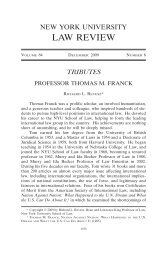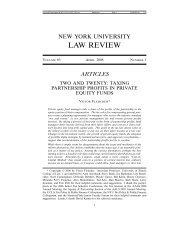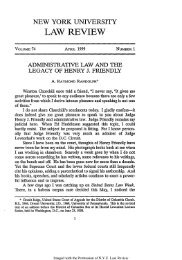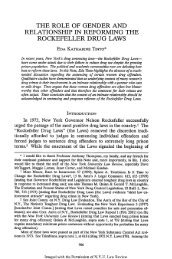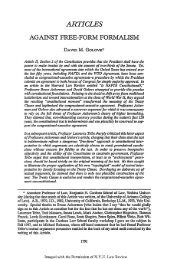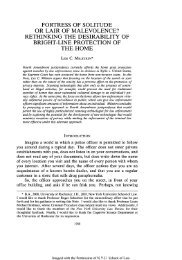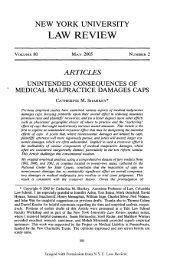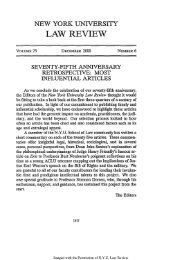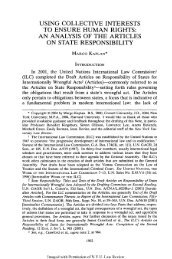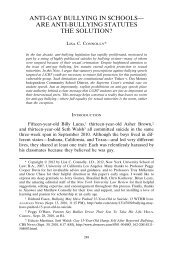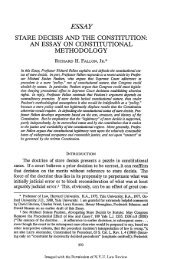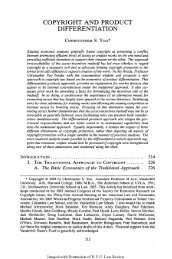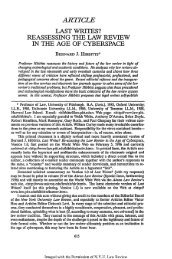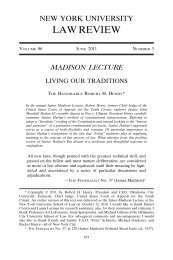Immigrants and the Right to Petition - NYU Law Review
Immigrants and the Right to Petition - NYU Law Review
Immigrants and the Right to Petition - NYU Law Review
You also want an ePaper? Increase the reach of your titles
YUMPU automatically turns print PDFs into web optimized ePapers that Google loves.
Imaged with <strong>the</strong> Permission of N.Y.U. School of <strong>Law</strong><br />
NEW YORK UNIVERSITY LAW REVIEW<br />
[Vol. 78:667<br />
<strong>the</strong>m across each colony; budgetary struggles <strong>to</strong> accommodate <strong>the</strong> financial<br />
hardships imposed on local communities; <strong>and</strong> legislation providing<br />
for "binding out" of Acadian children as indentured<br />
laborers.' 2 6 The refugees responded as <strong>the</strong> disenfranchised long had<br />
done in Britain: by petitioning. 127 Acadian petitions were directed <strong>to</strong><br />
<strong>the</strong> King, 12 8 o<strong>the</strong>r authorities in Britain, 12 9 <strong>and</strong> even <strong>to</strong> French <strong>and</strong><br />
Spanish officials.<br />
30<br />
Acadians in Massachusetts <strong>and</strong> Pennsylvania petitioned<br />
in opposition <strong>to</strong> legislation authorizing <strong>the</strong> forced binding out<br />
of children by local officials <strong>and</strong> won repeal of <strong>the</strong> measures in both<br />
colonies. 131 Refugees in Maryl<strong>and</strong> <strong>and</strong> Massachusetts petitioned for<br />
permission <strong>to</strong> leave <strong>the</strong> colony or <strong>to</strong> be reunited with relatives. 132 At<br />
least one group of Acadians actually petitioned <strong>to</strong> determine <strong>the</strong>ir citizenship<br />
status. 1 33<br />
The lack of a relationship between citizenship status <strong>and</strong> <strong>the</strong> right<br />
<strong>to</strong> petition was not unusual in colonial America. "Citizenship" was a<br />
fundamentally unsettled concept in <strong>the</strong> colonies <strong>and</strong> did not serve as<br />
<strong>the</strong> classifier of rights implied by <strong>the</strong> Verdugo-Urquidez majority; even<br />
a political right of <strong>the</strong> highest order, <strong>the</strong> franchise, was frequently extended<br />
<strong>to</strong> noncitizens under colonial laws. 134 While <strong>the</strong> colonists generally<br />
did consider <strong>the</strong>mselves subjects of Britain, subjectship law in<br />
126 See generally Griffiths, supra note 123, at 95-127; Plank, supra note 123, at 149-50.<br />
127 Griffiths, supra note 124, at 216.<br />
128 See Griffiths, supra note 123, at 103 & n.22 (citing <strong>Petition</strong> <strong>to</strong> <strong>the</strong> King of Great<br />
Britain, c. 1760, reprinted in L. Smith, Acadia: A Lost Chapter in American His<strong>to</strong>ry 369<br />
(1884)).<br />
129 Id. at 116 (recounting petition from Acadians resettled in Pennsylvania <strong>to</strong> Penn<br />
bro<strong>the</strong>rs in London regarding restitution of property seized during war); Griffiths, supra<br />
note 124, at 218 & n.20 (describing 1763 petition by Acadians in British seaports <strong>to</strong> Sick<br />
<strong>and</strong> Hurt Board of Admiralty requesting relocation).<br />
130 Griffiths, supra note 124, at 216, 220-21.<br />
131 See Griffiths, supra note 123, at 108 & n.39 ("[French] spelling <strong>and</strong> grammar [in one<br />
Massachusetts petition] indicate that it was most probably written by <strong>the</strong> Acadians <strong>the</strong>mselves.");<br />
id. at 115-16 & nn.76-77 (quoting petitions from Acadians in Pennsylvania). In<br />
<strong>the</strong>ir Pennsylvania petition, <strong>the</strong> Acadians pleaded that <strong>the</strong> binding out of <strong>the</strong>ir children<br />
made <strong>the</strong>m "<strong>the</strong> most unhappy People that ever appeared, if, after having lost what God<br />
had given us, for <strong>the</strong> Subsistence of our Families, we see ourselves forced <strong>to</strong> tear our Children<br />
from <strong>the</strong> Arms of our tender Wives." Griffiths, supra note 124, at 218 (quoting Philadelphia<br />
petition).<br />
132 Griffiths, supra note 123, at 109 (noting Acadian petitions <strong>to</strong> Massachusetts authorities<br />
seeking <strong>to</strong> reunite with relatives); id. at 117 (commenting on Acadian petition <strong>to</strong> justices<br />
of peace of Cecil County, Maryl<strong>and</strong> for assistance <strong>to</strong> depart for "<strong>the</strong> Mississippi").<br />
133 Griffiths, supra note 124, at 221 (quoting Philadelphia petition that asked, "Be<br />
pleased <strong>to</strong> tell us whe<strong>the</strong>r we are Subjects, Prisoners, Slaves or Freemen").<br />
134 See Jamin B. Raskin, Legal Aliens, Local Citizens: The His<strong>to</strong>rical, Constitutional<br />
<strong>and</strong> Theoretical Meanings of Alien Suffrage, 141 U. Pa. L. Rev. 1391, 1399 (1993) ("[Colonial<br />
law] generally required only that voters be local 'inhabitants or residents,' <strong>and</strong> not<br />
British citizens. . . . Thus, many alien 'inhabitants' who met <strong>the</strong> appropriate property,<br />
wealth, race, religion, <strong>and</strong> gender tests possessed <strong>the</strong> right <strong>to</strong> vote in <strong>the</strong> colonies.").



